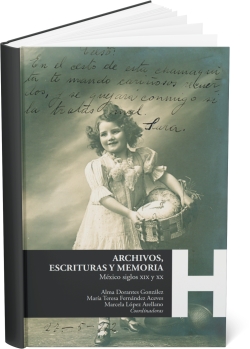ARCHIVES, WRITINGS AND MEMORY: Mexico XIX and XX centuries
Keywords:
History, Archives, Writings, Memory, Women, Public archives, Private archives, Personal archives, Autobiography, GenderSynopsis
This collective book, Archives, writings and memory. Mexico XIX and XX centuries, focuses on three axes: archives, writings and memory, analyzed in eight chapters. Some texts deconstruct the first axis and the concept of archives from different perspectives: etymological, meanings, uses, types and perspectives. The contribution of Archivos, escrituras y memoria is in the theoretical and methodological reflections of Archivos y archivos, which deals with the history or ethnography of several family, personal and private archives.
This book is made up of stories that, in addition to examining the lives and experiences of those who wrote them down in different texts, recognize the origin of the papers, the archival history they have followed, the guardians of their survival and their route to the encounter with each of the authors. It is interesting to observe how the archives and archives intertwine with each other to reconstruct each story. Although the authors focus their analysis on certain documents, to complement their work they also turn to other archives, public or private, in which they have located information that allows them to delve deeper into the stories they write. We see that this reconstruction and rescue of memory requires the documents kept and conserved by different agents, whose decisions for their security and preservation were varied, but which in the end make up the archival panorama of a country, with which the memory of the past is recovered.
On the subject of public archives, Julia Preciado analyzes the genesis and development of an institutional archive from the early years of independent Mexico. Regarding private archives in the custody of an institution and with public access, Cuauhtémoc Velasco Ávila and Antonio Cruz Zárate analyze the poems and love letters of a young man at the end of the 19th century, personal documents that make up a file of the Acervo Histórico de Testimonios Familiares (Biblioteca Manuel Orozco y Berra, Dirección de Estudios Históricos, INAH). Alma Dorantes González examines the autobiography of a merchant from the capital of Jalisco, as well as the writings added by relatives to those of her ancestor dedicated to mercantile business. On the subject of personal archives, but which were published with the authorization of the family that kept them, María Teresa Fernández Aceves presents a detailed analysis of the diary of a Mexican woman from the late 19th and early 20th centuries.
As for personal and family archives, preserved by families and not accessible to the general public, Mercedes Blanco presents a chapter on the archive of her aunt on her paternal line, jealously guarded in a trunk in her grandfather's house. Marcela López Arellano presents an analysis of the personal archive of a Mexican writer that has been preserved, but also divided up in the homes of several of the writer's children, part of which is kept by one of the grandchildren. Gabriela Aceves Sepúlveda presents her chapter on the family archive of cooking recipes that were produced by several women of her own family in different temporal contexts. Celia del Palacio Montiel reflects on the relationships between history, memory and autobiography, for which she resorts to private family archives, as well as autobiographies and biographies of her character already published, but little known.
We conclude that this collective book shows the importance of a constant dialogue with theory, methodologies and primary sources in order to carry out critical ethnographies of archives and archives, writing and memory. We agree with the feminist archival turn of recognizing family, personal and private archives as archives, as it is an act of authorization and power. This positioning makes visible the different agents in the production, management and maintenance of these archives.
Chapters
-
Introduction
-
Let's dismember our memory!The Western Inner State Collection, A Brief History (1824-1831)
-
The autobiographical writing of Nicolás de la Peña Muguiro, Creole merchant in Western Mexico, 19th century
-
The paper route. The archive of Eduardo J. Correa (1874-1964)
-
Non posso vivere senza di te: Enrique Zenteno's Collected Poems for Petra Rivera, 1883-1896
-
Traces of everyday life in the kitchen: reviving the recipe book of Mama Pina, 1885-2017
-
The family archive of a Spanish immigrant (1905-1920): Aunt Toña's boot
-
The navigation of emotions and feelings in Concepción Sánchez Aldana Romo de Vivar's diary in Guadalajara, 1908-1939
-
A thin thread to unite memory, history, gender and autobiography. Marie Langer (1910-1987): the feminist who belonged to the century

Downloads
Published
Series
Categories
License

This work is licensed under a Creative Commons Attribution-ShareAlike 4.0 International License.













